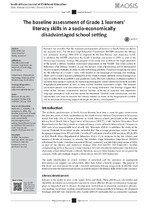| dc.contributor.author | Wildschut, Zelda | |
| dc.contributor.author | Moodley, Trevor | |
| dc.contributor.author | Aronstam, Shelley | |
| dc.date.accessioned | 2019-10-18T10:52:48Z | |
| dc.date.available | 2019-10-18T10:52:48Z | |
| dc.date.issued | 2016 | |
| dc.identifier.citation | Wildschut, Z., Moodley, T., & Aronstam, S. (2016). The baseline assessment of Grade 1 learners’ literacy skills in a socio-economically disadvantaged school setting. South African Journal of Childhood Education, 6(1), 9 pages. doi:https://doi.org/10.4102/sajce.v6i1.340 | en_US |
| dc.identifier.issn | 2223-7682 | |
| dc.identifier.uri | https://doi.org/10.4102/sajce.v6i1.340 | |
| dc.identifier.uri | http://hdl.handle.net/10566/5053 | |
| dc.description.abstract | Research has revealed that the academic performances of learners in South Africa are below the required level. The Western Cape Education Department (WCED) launched the literacy and numeracy strategy 2006–2016 in response to the low literacy and numeracy levels. In addition, the WCED introduced the Grade 1 baseline assessment in 2006, as part of the literacy and numeracy strategy. The purpose of this study was to observe the implementation of the Grade 1 literacy baseline assessment programme of the WCED. This study aimed to determine what literacy barriers, if any, the learners were experiencing and to recommend literacy support strategies, in order to inform teaching practices. Purposive sampling was used for the selection of a Grade 1 class, with English as the language of learning and teaching Thirty-seven Grade 1 learners participated in the study. A mixed-methods research design was used to collect both quantitative and qualitative data. The data collection strategies employed
included documentary analysis, by examining participants’ school admission forms to provide biographical information as well as their written baseline assessment scripts. The baseline assessment process was also observed as it was being conducted. The findings suggest that some of the learners experienced literacy barriers in terms of receptive and expressive language, perceptual skills and fine motor development. The data were summarised, and the information was used to describe the literacy barriers in terms of the biographical variables and to recommend learning support strategies for literacy development. | en_US |
| dc.language.iso | en | en_US |
| dc.publisher | AOSIS Publishing | en_US |
| dc.subject | Literacy | en_US |
| dc.subject | Baseline assessment | en_US |
| dc.subject | Barriers to learning | en_US |
| dc.subject | Writing skills | en_US |
| dc.subject | Reading skills | en_US |
| dc.title | The baseline assessment of Grade 1 learners’ literacy skills in a socio-economically disadvantaged school setting | en_US |
| dc.type | Article | en_US |

